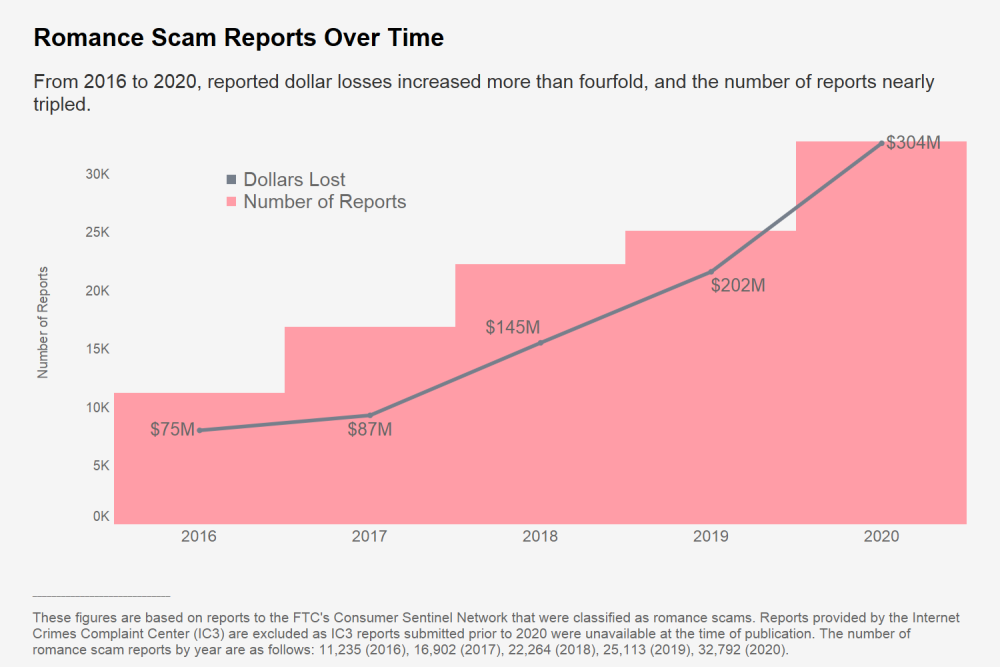A Sense of Doubt blog post #2193 - Losses to romance scams reach $304 million in 2020
BEWARE!!
Romance scams have branched out beyond romance sites.
https://www.zdnet.com/article/losses-to-romance-scams-reached-a-record-304-million-in-2020/
Losses to romance scams reached a record $304 million in 2020
The FTC believes the pandemic limited people's ability to meet in person, which contributed to a spike in successful online romance scams.
By Catalin Cimpanu for Zero Day | | Topic: Security
The current COVID-19 pandemic and the subsequent stay-at-home and social distancing directives might have played a major role in romance scams losses reaching record levels in 2020, the US Federal Trade Commission said in a report last week.
Total losses were estimated at a record $304 million, up about 50% from 2019, with the average loss last year being estimated at $2,500 per individual.
"From 2016 to 2020, reported total dollar losses increased more than fourfold, and the number of reports nearly tripled," the agency said.
The FTC believes that the 50% spike in extra losses recorded in 2020 can be attributed to the COVID-19 pandemic, which has limited people's ability to meet in person and has forced more users towards using online long-distance and impersonal communications, such as dating apps.
In most cases, the ruse of these scams is that the targets of a romance scam have to send money back to the crooks.
"Scammers claim to have sent money for a cooked-up reason, and then have a detailed story about why the money needs to be sent back to them or on to someone else. People think they're helping someone they care about, but they may actually be laundering stolen funds," the FTC said.
"In fact, many reported that the money they received and forwarded on turned out to be stolen unemployment benefits."
Furthermore, the FTC also warned that many romance scams don't always start on dating apps but also on social media networks.
"These social media users aren't always looking for love, and report that the scam often starts with an unexpected friend request or message," the FTC said.
"Sooner or later, these scammers always ask for money. They might say it's for a phone card to keep chatting. Or they might claim it's for a medical emergency, with COVID-19 often sprinkled into their tales of woe. The stories are endless, and can create a sense of urgency that pushes people to send money over and over again."
The most common forms of transferring money from victims were gift cards, which saw a 70% spike from 2019, followed by wire transfers.
And according to the FTC, all age groups are targeted last year, and not just the elderly. Victims aged 40 to 69 were targeted the most, victims aged above 70 reported the highest average losses (~$9,475), but other age groups also saw spikes in reports and average losses as well.
The US government agency urged users share its romance scam guide with vulnerable friends or family members as a way to reduce the efficacy of these scams going forward.

https://www.consumer.ftc.gov/articles/what-you-need-know-about-romance-scams
What You Need to Know About Romance Scams
Millions of people turn to online dating apps or social networking sites to meet someone. But instead of finding romance, many find a scammer trying to trick them into sending money. Read about the stories romance scammers make up and learn the #1 tip for avoiding a romance scam.
Romance scams reached a record $304 million in losses reported to the FTC in 2020. That’s up about 50% from 2019.
Romance scammers create fake profiles on dating sites and apps, or contact their targets through popular social media sites like Instagram, Facebook, or Google Hangouts. The scammers strike up a relationship with their targets to build their trust, sometimes talking or chatting several times a day. Then, they make up a story and ask for money.
The Lies Romance Scammers Tell
They’ll often say they’re living or traveling outside of the United States. We’ve heard about scammers who say they are:
- working on an oil rig
- in the military
- a doctor with an international organization
We’ve heard about romance scammers asking their targets for money to:
- pay for a plane ticket or other travel expenses
- pay for surgery or other medical expenses
- pay customs fees to retrieve something
- pay off gambling debts
- pay for a visa or other official travel documents
Scammers ask people to pay:
- by wiring money
- with reload cards like MoneyPak or gift cards from vendors like Amazon, Google Play, iTunes, or Steam
Scammers ask you to pay by wiring money, with reload cards, or with gift cards because they can get cash quickly and remain anonymous. They also know the transactions are almost impossible to reverse.
How to Avoid Losing Money to a Romance Scammer
Here’s the bottom line: Never send money or gifts to a sweetheart you haven’t met in person.
If you suspect a romance scam:
- Stop communicating with the person immediately.
- Talk to someone you trust, and pay attention if your friends or family say they’re concerned about your new love interest.
- Do a search for the type of job the person has to see if other people have heard similar stories. For example, you could do a search for “oil rig scammer” or “US Army scammer.” You can also browse the comments on our blog posts about romance scams to hear other people’s stories:
- Do a reverse image search of the person’ profile picture to see if it’s associated with another name or with details that don’t match up – those are signs of a scam.
How to Report a Romance Scam
If you paid a romance scammer with a gift card, contact the company that issued the card right away. Tell them you paid a scammer with the gift card and ask if they can refund your money.
If you think it’s a scam, report it to the FTC at ftc.gov/complaint. Notify the website or app where you met the scammer, too.
+++++++++++++++++++++++++++++++++++++++++++++++++++++++++++++++++++++++
+++++++++++++++++++++++++++++++++++++++++++++++++++++++++++++++++++++++
- Bloggery committed by chris tower - 2102.18 - 10:10
- Days ago = 2057 days ago
- New note - On 1807.06, I ceased daily transmission of my Hey Mom feature after three years of daily conversations. I plan to continue Hey Mom posts at least twice per week but will continue to post the days since ("Days Ago") count on my blog each day. The blog entry numbering in the title has changed to reflect total Sense of Doubt posts since I began the blog on 0705.04, which include Hey Mom posts, Daily Bowie posts, and Sense of Doubt posts. Hey Mom posts will still be numbered sequentially. New Hey Mom posts will use the same format as all the other Hey Mom posts; all other posts will feature this format seen here.




No comments:
Post a Comment